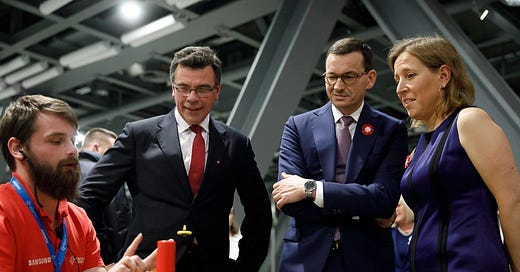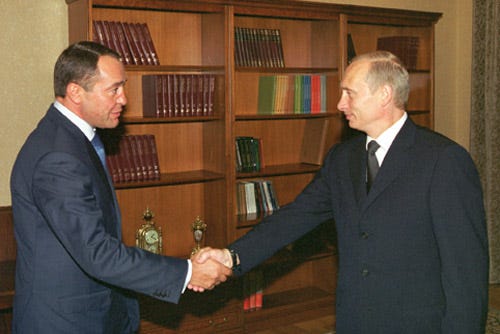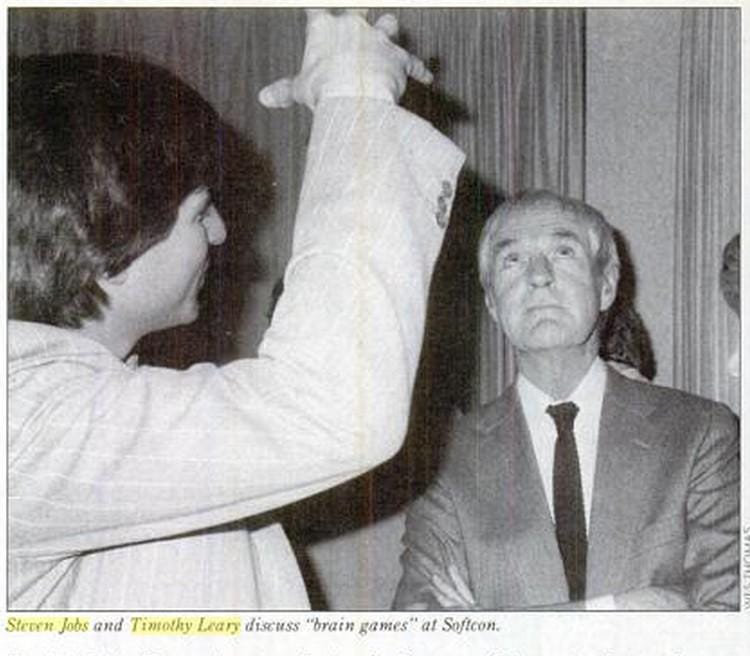Russia (and YouTube's) "Rape of The Mind" Versus Steve Jobs's "Bicycle For The Mind"
Senator J.D. Vance wasn’t so much an investor but an investment but he did back Rumble.
The recent death of YouTube CEO Susan Wojcicki, aged 56, ought to have occasioned more reflection than it did.
Silicon Valley doesn’t really do much introspection but maybe there’s something we may need to do for it, especially as GOP vice presidential hopeful J.D. Vance’s one successful investment — Rumble — was effectively a YouTube clone albeit one with de minimis censorship.
We’ve elsewhere argued that J.D. Vance wasn’t so much an investor but an investment. We’ve written about Rumble before in this Substack and why it needs a federal investigation.
Now it’s a bit rough to say this but I’m hard pressed to find a family that did more harm to America than Wojcicki sisters Susan and Anne. (I’m excepting Janet, who as a doctor of anthropology and epidemiology, presumably does less harm though I am totally unfamiliar with her work and for all I know she’s the worst of the bunch.)
Still, it’s not an exaggeration to say that thanks to YouTube we’ve lost a generation of young men and that thanks to personal genomics company 23 & Me we’ve lost a generation of progress toward a more American-styled approach to genomics.
I’ve often contemplated: How did we go from a bicycle for the mind to the rape of the mind? Look no further than the Wojcicki sisters.
How much we ought to blame the Wojcicki sisters and how much they were a useful front for other interests is an interesting question one which I’ll return to later. Perhaps the Wojcicki daughters, raised as they were at Stanford itself a deeply problematic school, had no chance.
I was perhaps a little too rough on Malcolm Harris’s 2023 tome, Palo Alto: A History of California, Capitalism, and the World, about the wickedness of his hometown. He’s clearly on to something. Do schools like Stanford select for a kind of sociopathic behavior? I often wonder.
Perhaps there was something about Stanford having crooked origins. Who did kill Jane Stanford anyway? I mean how many other colleges have a book like Who Killed Jane Stanford?: A Gilded Age Tale of Murder, Deceit, Spirits and the Birth of a University (2023) which details the alleged poisoning of the proprietor of her namesake university? And that’s before we even go there on the Hoover Institution itself founded by Herbert Hoover to preserve his records from the First World War while boasting of his fortune itself procured through dubious associations in China and Australia. Extraction, extraction, extraction! (Whenever there’s an extractive industry there’s always the Russians looming…)
We’ve discussed the relationship of Russian-Jews as ferrying information and technology between the United States and the Soviet Union. I suspect that’s more or less the role that many ethnic minorities played dealing with the two superpowers. It certainly seems to be the role played by refusenik Jews. (We discussed this at length when we took on Sheryl Sandberg and the emergence of Facebook.)
When you follow the official story about Google you’re told that Larry Paige and Sergey Brin started their company in Susan Wojcicki’s garage.
Yeah, OK.
“Brin and Page had performed their work with funding from the Digital Library Initiative (DLI), a multi-agency programme of the National Science Foundation (NSF), NASA and DARPA,” writes Nafeez Ahmed in his piece “How the CIA made Google.”
Ahmed continues:
“We funded Stanford University through the computer scientist Jeffrey Ullman, who had several promising graduate students working on many exciting areas,” Prof. Thuraisingham told me. “One of them was Sergey Brin, the founder of Google. The intelligence community’s MDDS program essentially provided Brin seed-funding, which was supplemented by many other sources, including the private sector.”
This sort of funding is certainly not unusual, and Sergey Brin’s being able to receive it by being a graduate student at Stanford appears to have been incidental. The Pentagon was all over computer science research at this time. But it illustrates how deeply entrenched the culture of Silicon Valley is in the values of the US intelligence community.
In an extraordinary document hosted by the website of the University of Texas, Thuraisingham recounts that from 1993 to 1999, “the Intelligence Community [IC] started a program called Massive Digital Data Systems (MDDS) that I was managing for the Intelligence Community when I was at the MITRE Corporation.” The program funded 15 research efforts at various universities, including Stanford. Its goal was developing “data management technologies to manage several terabytes to petabytes of data,” including for “query processing, transaction management, metadata management, storage management, and data integration.”
At the time, Thuraisingham was chief scientist for data and information management at MITRE, where she led team research and development efforts for the NSA, CIA, US Air Force Research Laboratory, as well as the US Navy’s Space and Naval Warfare Systems Command (SPAWAR) and Communications and Electronic Command (CECOM). She went on to teach courses for US government officials and defense contractors on data-mining in counter-terrorism.
Rather curiously in the Brin story no one seems to mention his father’s role as a Moscow-educated Mikhail Brin who taught at the University of Maryland or his mother Eugenia Brin working at NASA.
Legend has it that a trip to Warsaw convinced Mikhail to move to the West. Maybe. That’s the story. Or maybe he was sent by the Russians to the United States during the Brezhnev period.
While they waited for their exit visa Mikhail supposedly supported the family by translating Russian material into English. (Who paid for that, I wonder?)
In any event they got out of the Soviet Union rather quickly and went first to France’s Institut des Hautes Etudes Scientifiques (co-founded by Oppenheimer, naturally) and then to Maryland. “We hoped it would happen,” Eugenia says, “but we were completely surprised by how quickly it did.” (Why did it happen so quickly?)
Their sherpa in America? None other than Washington, DC-born Anatoly Katok who later became a professor at Penn State before being effectively kicked out of the University of Maryland. (Katok’s parents were stationed in D.C. working for the Soviet Union when he was born.) There’s some indication that Katok’s Penn State was being funded by Jeffrey Epstein. We don’t know how much money or if it was, you know, actually Epstein’s money.
I covered some of this elsewhere when I wrote a bit about Eric Schmidt.
A friend of mine went to St. Petersburg in March 2003 on a school trip.
On the last leg of the trip the American students were taken out to an academic seminary. The topic was very math but related to a new way of web search that was way faster than normal.
You’re not supposed to think too hard about Sergey Brin, born in the former Soviet Union, or how Jeffrey Epstein, tied in with Russian-Jewish cash, attended the very same Interlochen summer camp that Larry Page credited with his intellectual upbringing.
Brin married Anne Wojcicki, the sister of Susan, and herself half-Russian Jewish, half-Polish. Were the Wojcickis assigned to Brin? We have a hard time talking about the wife as handler but maybe we ought to get over ourselves and understand that among groups that are highly controlled and scripted of course startup CEOs and their backers are assigning them wives.
To what extent itself has Google itself been taken over? I leave that for others to contemplate.
If you were the intelligence community wouldn’t you want to control the entire search results of the world?
When we discussed Elon Musk we talked about the technologist as thief or smuggler. We note, in passing, how many of the early PayPal guys were from resource extraction families, especially from South and Southern Africa.
As the U.S. battles China for the resources of subsaharan Africa we might ask about all the waste that Musk’s vehicles or David Sacks’s scooters have visited upon the world.
There’s a moral imperative whenever you extract to extract the least amount necessary for the task. What goes for the environment goes even more so for people.
What is Facebook if not extracting from people? When we were starting Clearview we were in some sense renationalizing the photos that had been provided by vanity.
YouTube is datamining through mesmerism. They want you in that trance. When YouTube was first rolled out — it became Time Magazine’s 2006 person of the year — you could be forgiven for thinking that you were empowered.
The sharing economy became the snitching economy awfully fast.
In Soviet Russia, television watches you! (Unless you’re in a Trump property. Trump purportedly bought 200 television sets for the hotel from Semyon Kislin, a Soviet émigré who co-owned Joy-Lud electronics on Fifth Avenue.)
In America, YouTube watches you—and then gives the content to Russia and China.
****
A real assessment of television’s impact on the collective psyche of Americans is probably worth doing at some point.
You’d have to contend with Rupert Murdoch, the Herrings, and of course, the creation of RT, and you’d have to go there with Fox News runner Roger Ailes and his 1995 book, You Are The Message: Getting What You Want by Being Who You Are, and how he got so many Americans to vainly prostrate themselves — sometimes literally — to have a shot at talking to millions of people.
You’d probably also have to discuss how much of American life is fundamentally pretty lonely and how that loneliness drives millions of Americans night after night to plop themselves in front the only warmth in their lives — the yellow glow of the television screen talking as you drift off to sleep.
Part of the obsession with television has to do with social control, something dictators have always sought in their own country.
How about in other countries? Funny you should ask.
Sarah Ashton-Cirillo, an NCO for Ukrainian Defense Forces, recommended I read a book, The Rape of the Mind: The Psychology of Thought Control, Menticide, and Brainwashing (1961), by a Dutch psychologist Joost A. M. Meerloo. Meerloo wrote about the Nazi and later Soviet and Chinese brainwashing campaigns. (Did you know that the Chinese wanted to blame us for causing a bad harvest?)
There’s quite a bit of discussion of Pavlov and conditioning (fair enough) but I would have made mention of Belyaev and the foxes. You can select people for docility — or aggression—or suggestibility.
Meerloo wrote about the power of hypnosis:
Radio and television have enhanced the hypnotizing power of sounds, images, and words…
It is not only the suggestive power of these media that gives them their hypnotizing effect. Our technical means of communication make of the people one huge participating mass. Even when I am alone with my radio, I am technically united with the huge mass of other listeners. I see them in my mind, I unconsciously identify with them, and while I am listening I am one with them. Yet I have no direct emotional contact with them. It is partly for this reason that radio and television tend to take away active affectionate relationships between men and to destroy the capacity for personal thought, evaluation, and reflection. They catch the mind directly, giving people no time for calm, dialectical conversation with their own minds, with their friends, or with their books. The voices from the ether don’t permit the freedom-arousing mutuality of free conversation and discussion, and thus provoke greater passive acceptance—as in hypnosis.
Many people are hypnophiles, anxious to daydream and day-sleep throughout their lives; these people easily fall prey to mass suggestion.
The lengthy oration or the boring sermon either weakens the listeners and makes them more ripe for the mass spell, or makes them more resentful and rebellious. Long speeches are a staple of totalitarian indoctrination because finally the boredom breaks through our defences. We give in. Hitler used this technique of mass hypnosis through monotony to enormous advantage. He spoke endlessly and included long, dull recitals of statistics in his speeches.
Some people like being slaves—and it’s easy to enslave a free people by catering their vices. This is why you see the Russians and Chinese and Israelis all over the drug trade in the United States. It’s not a coincidence that Susan Wojcicki’s son died of a drug overdose. She’s in the drug business too. There’s no RIP for that sort of behavior but there are plenty of pieces left behind.
We’ve talked before about video games when we talked about the national security threat of Microsoft buying Activision. (Go on search the archives!)
This is dangerous stuff and it’s a public health and national security problem.
****
“The question is - what is the difference between a television program and a computer program? Everyone is familiar with television programs. Computer programs contain a lot of new principles, but they are all subject to one main principle - interactivity,” Jobs told the Russian academics.
“I just don’t like television. Apple will never make a TV again,” Jobs purportedly told Jony Ive in 1997. Apple would ultimately make an Apple TV over Jobs’s dead body.
He preferred to open his mind — maybe a little too open if his FBI file is to be taken seriously.
On July 4, 1985 Steve Jobs went to the Soviet Union. By the end of summer 1985 he was gone from Apple. Jobs, of course, died in 2011.
In 1990 Bill Gates visited Russia and continued to travel to the country, carry on affairs with Russian women and allow Russian Jews (Israeli and Russian) to put in backdoors to his products. We’re told that Gates still controls Microsoft quietly.
Steve Jobs always had a bit of the spook in him. He apparently wanted to help George H.W. Bush start a “revolution from below” — Soros and Open Society-style.
Jobs said he had a “feeling” that the attorney — likely Samuel Pisar, Antony Blinken’s stepfather who coincidentally was the last person to see Robert Maxwell alive — who helped organize his trip to the Soviet Union “worked for the CIA or the KGB.”
Jobs went to Russia with Al Eisenstat, then the head of legal affairs at Apple. This detail is simply fascinating.
Apple VP Al Eisenstat stayed in the same Moscow hotel as Jobs. One night, Eisenstat was awakened by the sound of a nervous computer programmer knocking on his door.
When he answered it, the coder pushed a floppy disk into his hand. Upon Eisenstat’s return to the United States, he discovered the disk contained accurate handwriting-recognition software.
According to several members of the Apple Newton team I’ve spoken to, this code became the basis for the handwriting recognition built into the Newton MessagePad.
(The Russians are quite far along on image recognition as well — something I can attest to from when I cofounded Clearview.AI.)
It’s become gauche in recent years to talk about Laurene Powell Jobs and her Emerson Collective as a front for the Israeli world with corresponding investments in Axios and The Atlantic.
We’re going to need to talk about that at some point, especially given J. D. Vance working for IDF agent David Frum, a senior editor at The Atlantic.
That’s for another time. At some point I’ll get around to writing the piece about why Ghislaine Maxwell needs to be freed from federal prison. Soon, soon, I promise.
Until then it’s worth returning to Jobs’s speech in Russia which suggests another possible future.
You’ll find all the hallmark Jobsisms there. It’s interesting to contemplate a Jobs-Gorbachev meeting but it wasn’t to happen.
Why not build a better bicycle?










Good piece Charles very well done 👍